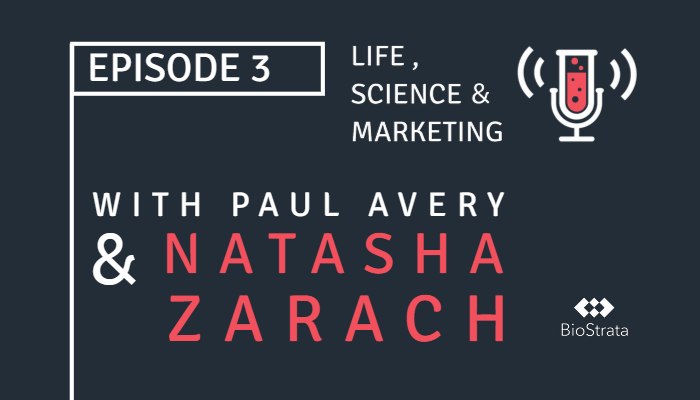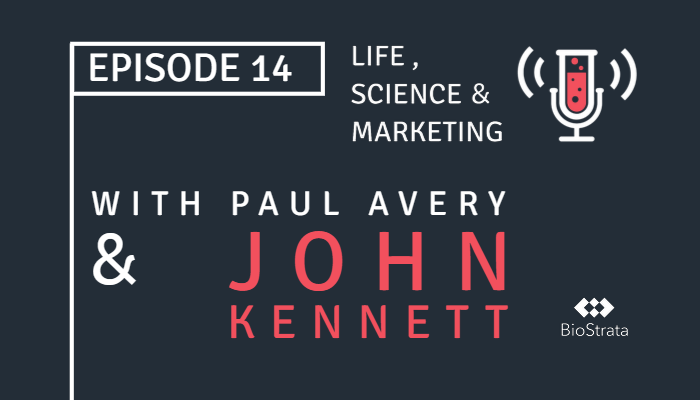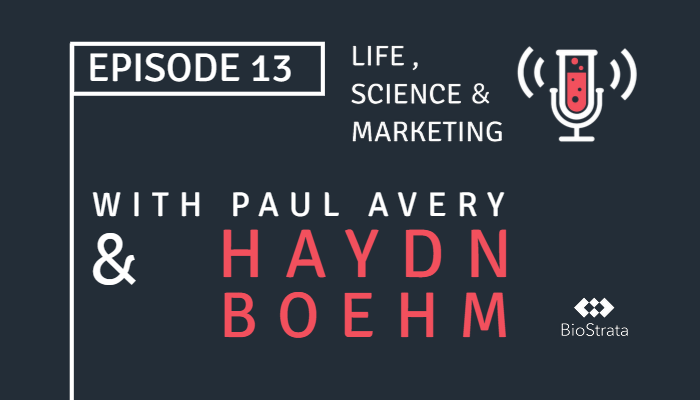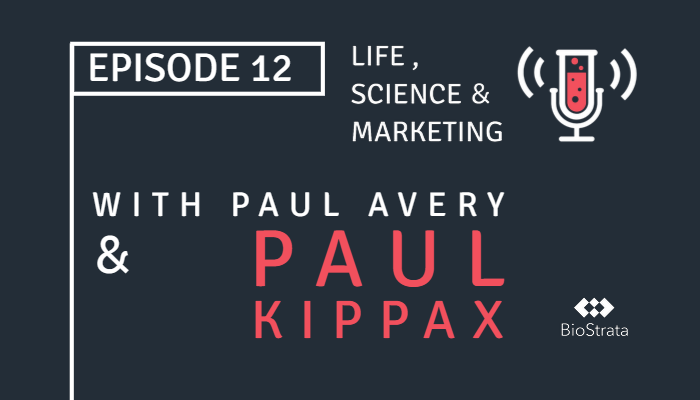Natasha Zarach: Culturalising campaigns and international marketing in China to authentically engaging scientists and marketing innovations globally.
Our new "Life, Science & Marketing" podcast features in-depth discussions between host and BioStrata CEO, Paul Avery, and science marketing professionals from across the globe. In each episode, guests share their background, motivations, and advice on marketing strategies and best practices.
In the latest episode, Paul had an in depth discussion with Natasha Zarach, International Head of Marketing at Veolia. With experience spanning technology, environmental science, and global marketing, Natasha provided fascinating insights on culturalising campaigns, marketing effectively in China, and staying authentic when engaging scientists.
Read on for a summary of episode 3 and Natasha’s journey from the technology industry to leading international marketing in life sciences. You can also listen to the full conversation in the podcast episode below or find us on your favourite podcast platform.
Can you tell us a bit about your career story? How did you end up in your current role?
Natasha Zarach: I'd love to say I knew exactly what I wanted to do from an early age, but I didn't. I'm not entirely sure I still do! I kind of fell into the technology industry by accident and did a number of roles across product management, sales and marketing, both in the UK and overseas, which was good fun. I reached a stage where I was done with binary - I wanted something more human than ones and zeros. So I moved to Veolia, where I've been for over a decade now. Veolia is one of the most influential environmental groups worldwide, and that really appealed to me. But I worked for a really tiny business unit within the group, focusing on science and healthcare markets. That's kind of where I ended up. I'd love to say I had a vision and a path, but I didn't - it's definitely one that's more flowy, like water.
My current role is mainly focused on the science and healthcare markets. But we are getting more segmented within those markets. So we're developing the pharma verticals, food and beverage, etc. It's expanding still within healthcare and science, but becoming more segmented. But that's probably driven as much by our organisational structure as trying to connect with the right people from a customer point of view.
What are you passionate about outside of work?
Natasha Zarach: Yoga for one - ironic as I have a friend who often yells at me "just sit still for a minute!" I think that's why yoga is good for me. I'm always doing something, always learning. At the moment, my current new thing is pottery. For me, it's kind of turned into a bit of a metaphor - everything's a bit wonky but mostly functional. I've achieved it! So it's often exploring something new, learning something new, which suits marketing really, because it's forever changing.
Can you share an interesting story about yourself that not many people know?
Natasha Zarach: I was once invited on stage in Vegas by David Copperfield and he made me disappear on stage as part of the show! Obviously I'm not allowed to tell you how it works because what goes on in Vegas stays in Vegas. But it was so cool to be part of his show and experience the magic circle.
What science project that you've worked on has most interested you and why?
Natasha Zarach: I really enjoyed working on a case study with the Italian National Antarctic Research Program at the University of Venice. I spent quite a bit of time with them and got into what they were doing. They used our lab water purification equipment on their research ships in Antarctica as well as in their labs in Venice. They took ice core samples, melted them back to water, and analysed those as well as marine snow and aerosol samples down to ultra trace levels of substances. They were looking at our impacts on the pristine Antarctic environment, but also biomass burning events from thousands of years ago. It was absolutely fascinating work and great to spend time in their labs. Our equipment there is vital because they can't detect something in their reagents by accident and ascribe it to the sample - that would be disastrous.
What area of science currently most excites you?
Natasha Zarach: I'm really interested in pharma, drug discovery, AI and drug discovery - huge things! How is AI going to play out for what is typically a 10-15 year, extremely costly process? As an expert on AI, you probably have more insights than me. But it simultaneously absolutely petrifies and excites me. The possibility of AI reducing the cost and time to market, and finding cures for rare conditions because now they are viable - from that perspective it's fascinating to watch how it pans out.
What advice would you give someone just starting out in life science marketing?
Natasha Zarach: Be curious - that's the one aspect I always look for in interviews. Don't just be curious about marketing, be curious about your entire organisation. Take opportunities to work in other departments, even if unrelated to marketing. Go build products, work in tech support, go out with sales. As a marketer you're representing everything in the organisation. It's important to understand the bigger picture and apply that to customers too. Don't just look at what they do, but everything they're trying to achieve, to make the right connections.
What do you love most about what you do?
Natasha Zarach: What gets me out of bed is connecting people. I've always enjoyed international roles. I like that one day I'm figuring out how to connect with a lab manager in China, the next day in Germany. The variety as a challenge is fascinating, culturally understanding those differences. Doing that in a science environment, where the advancement keeps it fresh, along with marketing changing every two minutes, suits me.
What are the biggest challenges in marketing internationally?
Natasha Zarach: The biggest challenge is don't localise, culturalise! It's easy to take what we've done and translate it for another market. But you really must culturalise for what you're trying to do rather than just translate.
For example, I recently spent time with colleagues in China preparing campaigns. Obviously the language is different, but how they use social media is vastly different. They don't have our Western platforms like LinkedIn or Twitter. They use WeChat, which blends business and personal lives. Connections made for business mean you also see everything happening privately. There's no separation.
Visually, I like white space in design but they want to fill everything. Our websites have to look very different. How we drive traffic obviously changes too. The more input to understand the landscape, the better.
What have you learned about marketing better in China?
Natasha Zarach: Go back to the culturalisation versus localisation point - that is absolutely key. When marketing into science, there's a blend because if you work with international companies in China, the lab managers have often been educated overseas. So you need both languages for follow up.
Keep in mind you have to start from scratch - no markers to take from outside China. More networking, more people inputting to understand the landscape. The principles and theory are the same, just completely different players.
What are the biggest challenges in life science marketing?
Natasha Zarach: Authenticity. I've worked in other industries outside life sciences. Scientists are the toughest people to market to, rightly so. Their psyche is to question everything. If you're not a scientist, in sales or marketing, you don't stand much chance.
We must be genuinely authentic about the content we're putting out - will it really help them? Things that even hint at greenwashing will be uncovered in minutes. So authenticity is key to connect the right content, not just putting stuff out for the sake of it.
What has been your favourite marketing campaign you've implemented?
Natasha Zarach: It was the first online campaigns I worked on with Firestarter years ago when we were all a lot younger! I was in a fairly traditional B2B manufacturing business unit but we had to promote globally with a tiny team. So we took most of our offline budget online - around 70% I think. I remember the first time sitting watching live tracking of landing pages as the campaign happened. Much better than delivering an event and having no idea of the impact after! I can't remember the details but it was when you and I first met and started pioneering online marketing in life sciences.
What is your single best marketing tip?
Natasha Zarach: Be willing to change and experiment - like switching our strategy from offline to online back then. And stay curious about who you're connecting with, so you can create better ongoing campaigns and approaches.
What do you think is the biggest missed opportunity for life science marketing?
Natasha Zarach: It's about data and connectivity. I loved working with online marketing because you can measure results, unlike when it was a dark art before that. But now we collect so much data across our organisations and it's not connected. So we struggle to build the right pictures of who we want to target, be authentic and relevant with. It's both an art and a science - the art drove things for years but the science came into its own with digital. We need to be better at managing and connecting our data, and take it easy on our IT folks! That's a constant problem, ensuring connectivity.
Learn more marketing insights on the Life, Science & Marketing Podcast
We thank Natasha Zarach for sharing her extensive marketing knowledge and experiences in this episode. She welcomes further discussions on international marketing, engaging scientists, and life science innovations via her LinkedIn.
Look out for upcoming episodes of "Life, Science & Marketing" to hear more from global leaders in our field. We'll continue bringing you valuable insights and actionable advice.
You can also follow the podcast's LinkedIn page to keep up-to-date with the latest news and episode releases. We look forward to seeing you there!




